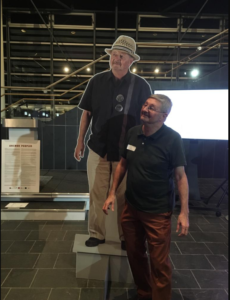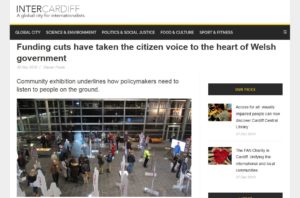Weathering The Storm
ANCHOR PEOPLE

WELCOME ADDRESS
SENEDD: 29 NOVEMBER 2018
Good evening! My name is Eva Elliott and I am from Cardiff University School of Social Sciences, based in WISERD – otherwise known as the Wales Institute of Social & Economic Research, Data & Methods.
Welcome to the Senedd to our Anchor Peoples exhibition and thank you to Mark Drakeford for his kind sponsorship. He sadly sends his apologies this evening as he does have a couple of matters that are keeping him busy … Brexit, leadership election!
Anchor Peoples emerges from a project which was part of a 5-year research programme entitled Productive Margins: Regulating for Engagement. It was led by Morag McDermont with a group of academic researchers from Bristol and Cardiff Universities and involved a number of community organisations from Bristol and South Wales – we had two in South Wales — South Riverside Community Development Centre (SRCDC) in Cardiff and 3Gs Development Trust in Merthyr Tydfil.
The focus of the research was on regulation and how we might understand regulatory regimes as processes that can be designed to actively include people and communities who have been traditionally marginalised by them. A key conviction is that when you involve people you release their expertise, knowledge and creativity and that this can be politically productive.
We have co-produced seven research projects the final one being Weathering the Storm: the hidden value of community anchors. Community anchors, as we see them, are organisations that are rooted, and have emerged from, their communities. As anchors they have evolved sufficiently to have established structures that can provide a local infrastructure for the people and groups who live there. They are often successful in attracting funding and are skilled in developing projects and programmes that are meaningful to local people. They can be visible in terms of public services and government agencies, and may be asked to ‘sit at the table’ at planning or strategy meetings. A small number of community anchors in Wales were invited to deliver activities for the Communities First programme and employ staff.
The two community partners in South Wales — South Riverside Community Development Centre (SRCDC) in Cardiff and 3Gs Development Trust in Merthyr Tydfil — were created by local people for their local communities 40 and 20 years ago. They developed ways of working that earned the trust of many of the people that they both lived with and served. As community organisations, anchored in the everyday lives of the people around them, they became the vehicles for the local delivery of the Wales’ flagship regeneration (and latterly) anti-poverty programme, Communities First.
The Communities First programme, launched in 2001, reflected a vision for a new Wales where ‘community’ was not just seen as a nostalgic fiction, but real and with transformative power. In its origins it spoke of the need for a change to the regulatory processes that shape the relationship between citizens and the state.
Both organisations were pleased to be part of the Communities First programme, believing that this would place their communities at the centre of national efforts to address inequality and, by extension, reduce poverty. At the margins no more. The national and the local in one holistic space.
However, whilst the government’s visionary promise eroded over the years, the people working in these, and other, community anchor organisations continued to develop the knowledge, skills and networks that kept their communities afloat through times of economic hardship and austerity.
On the 13th October 2016 the BBC Wales website announced: “Communities First anti-poverty scheme is to be dropped”. This is how community development workers across Wales first learned about their fate.
The final Productive Margins research project is a witnessing of the storm that these organisations have laboured to weather. It is also a testament to the craftwork, skill and expertise of community development which is in danger of being lost to many communities across Wales.
The research was conducted through interviews and participatory workshops with people working, and volunteering, for the community organisations. Monthly research group meetings were also recorded so that the experiences of the organisations, their staff and their communities could be tracked through the phasing out of Communities First.
The art installation is built on this research. It brings to the fore the people, the anchor people, whose deep experience of the communities they serve really should be seen and heard. Working with us (and with representatives from SRCDC and the 3Gs), in a spirit of coproduction, we believe the artists have achieved this magnificently.

